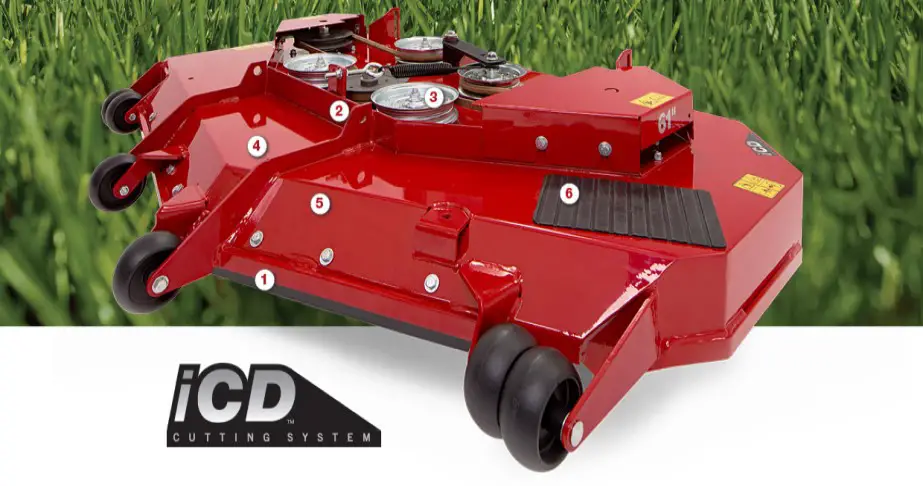The Ferris ICD deck system is a revolutionary feature that sets Ferris mowers apart from the rest.
This innovative technology allows you to independently control each mower deck, achieving exceptional cutting precision and maneuverability.
The design of the deck has a significant impact on the blade selection process, as it determines how effectively the blades can engage with the grass and deliver a clean cut.
With the right blades, you can experience improved cut quality, reduced maintenance, and increased productivity.
Best Blades for Ferris ICD Deck
Below are the most recommended blades to choose from. You can get any of the blades online here.
1. Ferris 5101756X2 36” Deck Blade
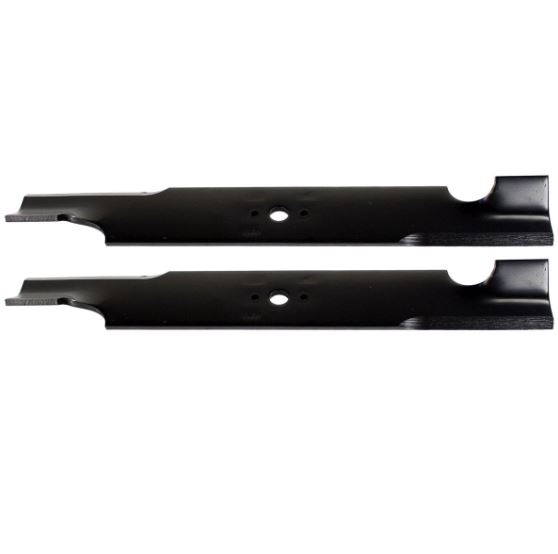
2. Ferris 5061827s Blade Set, 44” Deck
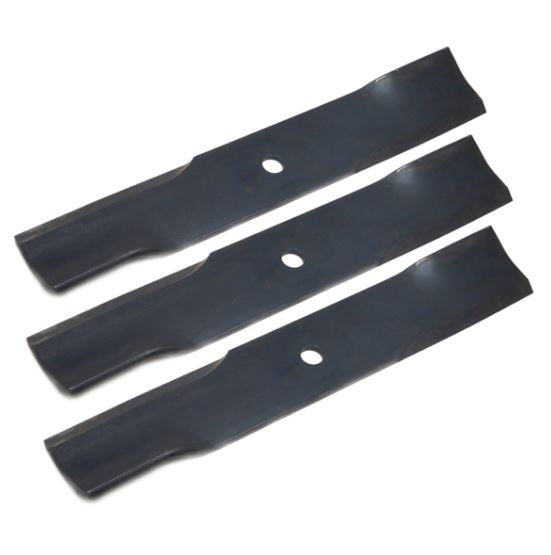
3. Ferris 5101986s Blade Set, 48” Deck
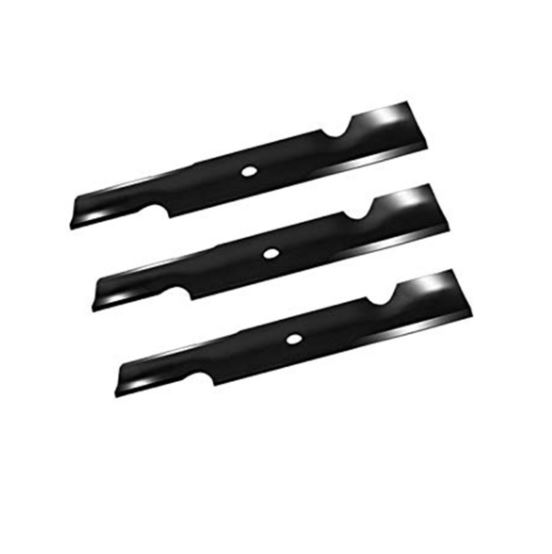
4. Ferris 5021227s Blade Set, 52” Deck
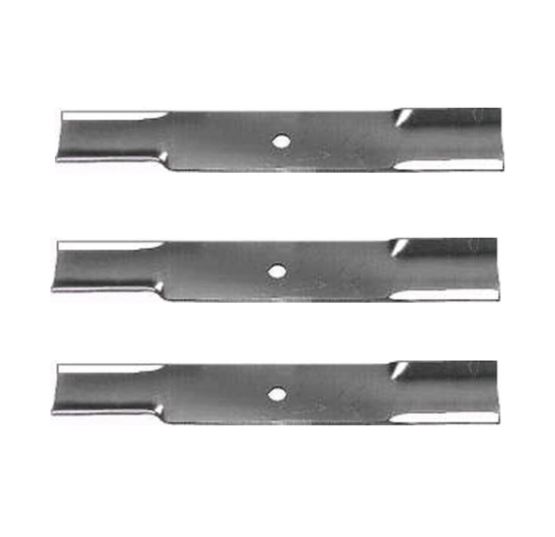
5. Ferris 5101755s Blade Set, 61” Deck
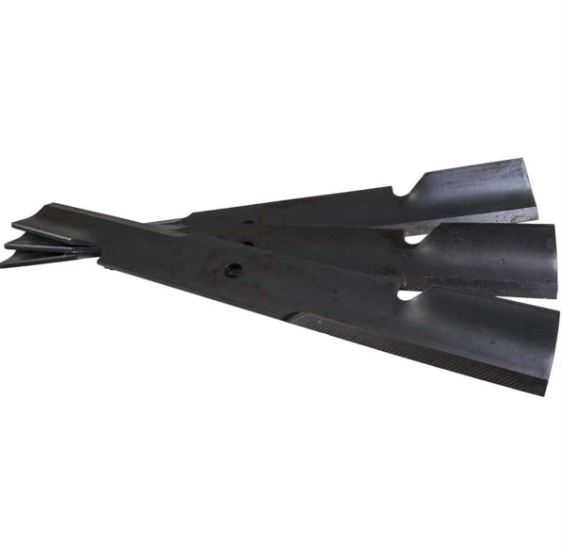
6. Ferris 5102227s Blade Set, 72” Deck
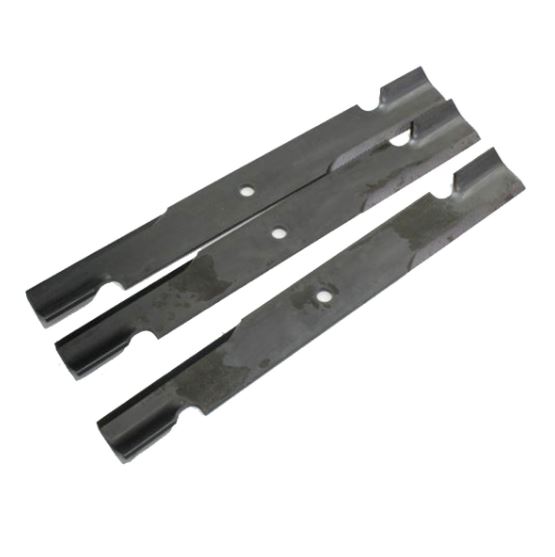
Related: Qwikchute vs. Grass Flap
Types of Blades for Ferris Decks
Standard Blades
Standard blades are the most common and widely used type of blade for Ferris ICD decks.
They’re known for their versatility and ability to handle various mowing conditions.
These blades have a traditional shape with a curved cutting edge, which ensures a reliable and consistent cut across the entire mowing area.
Standard blades are designed to provide an all-purpose cutting performance, making them suitable for regular grass-cutting tasks.
They work effectively in maintaining a well-groomed lawn, especially in situations where the grass is not overly dense or challenging.
One of the advantages of standard blades is their widespread availability.
They’re commonly stocked by retailers and are often included as the default blade option with Ferris mowers.
If you prefer a straightforward approach to mowing without any specialized requirements, standard blades are an excellent choice.
Mulching Blades
These blades have a unique design that focuses on finely chopping grass clippings and evenly distributing them back onto the lawn.
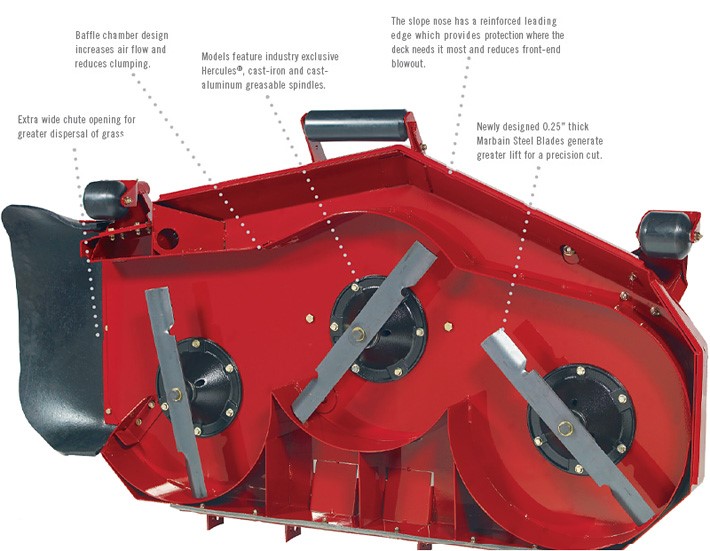
They feature additional cutting edges and airflow enhancements to facilitate the mulching process.
When using mulching blades, the grass clippings are cut into smaller pieces, allowing them to decompose quickly.
As the clippings decompose, they release valuable nutrients back into the soil, acting as a natural fertilizer.
This process promotes a healthier lawn by providing essential nutrients, improving moisture retention, and reducing weed growth.
One of the key benefits of mulching blades is their ability to eliminate the need for bagging or raking grass clippings.
Instead of collecting and disposing of the clippings, mulching blades redistribute them back into the lawn, saving time and effort.
This practice also helps in maintaining a clean and manicured appearance, as there are no unsightly clumps of grass left behind.
Related: 3 Best Types of Lawn Mower Engines
High-Lift Blades
They’re specifically designed to create strong airflow and effectively lift and discharge grass clippings.
They’re particularly useful in situations where bagging or side discharge is required.
These blades feature a higher lift profile, a larger cutting surface, and an increased blade angle to facilitate efficient grass discharge.
The high-lift design of these blades enables them to generate powerful airflow, which propels the clippings up and out of the deck, ensuring efficient grass ejection.
This feature is particularly advantageous when mowing in challenging conditions, such as when the grass is wet or dense.
By effectively discharging the clippings, high-lift blades help prevent clogging and maintain consistent cutting performance.
Furthermore, high-lift blades are beneficial for bagging applications.
The increased lift and airflow assist in collecting the clippings and directing them into the bagging system, resulting in improved bagging efficiency and reduced clumping.
Gator Blades
Gator blades are a specialized type of blade that’s highly regarded for their exceptional mulching capabilities.
These blades have serrated edges and additional cutting surfaces, which set them apart from standard and mulching blades.
The serrated edges aid in cutting tough or dense grass more efficiently, ensuring a clean and precise cut.
The unique design of Gator blades allows them to create finer grass clippings compared to other blade types.
This finer mulch promotes superior nutrient recycling as the smaller clippings decompose more quickly.
Also, the finer mulch helps in achieving a professional-grade cut quality, resulting in a well-manicured and aesthetically pleasing lawn.
Gator blades are particularly popular among homeowners and professionals who prioritize both mulching performance and cut quality.
With their advanced cutting technology, these blades deliver outstanding results, leaving your lawn looking pristine and healthy.
Related: How to Make a Homemade Lawn Mower Discharge Chute
Factors to Consider When Choosing Blades
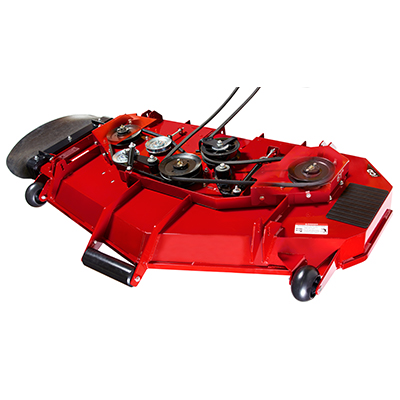
Grass Type and Mowing Conditions
When choosing blades for your Ferris ICD deck, it’s important to consider the type of grass you’ll be mowing and the prevailing mowing conditions.
Different grass species have varying characteristics that can influence the performance of the blades.
For example, Bermuda grass and Kentucky bluegrass have different growth patterns and densities, requiring blades that can handle their specific attributes.
You should also take into account the mowing conditions you typically encounter.
Factors such as wet or dry grass, tall or short grass, and the presence of debris can impact the effectiveness of the blades.
Some blades are designed to handle specific conditions better than others.
For instance, if you often mow wet grass, you may need blades with enhanced airflow capabilities to prevent clogging.
Research the compatibility of various blade types to ensure you select the most suitable blades for your grass type and mowing conditions.
Consult the manufacturer’s recommendations, seek advice from professionals or fellow landscapers, or explore online resources to gather insights on which blades work best for your specific scenario.
Related: Dump Trailer Hydraulic Fluid: Everything You Need to Know
Blade Length and Deck Size
Another crucial factor to consider when choosing blades is the blade length, which should correspond to the size of your Ferris ICD deck.
The blade length determines the cutting coverage and directly affects the efficiency of the mowing process.
For larger decks, longer blades are generally required to ensure adequate cutting coverage, minimizing the number of passes needed to complete the mowing task.
Using blades that are too short for your deck size may result in uneven cuts or require additional time and effort to achieve a uniform appearance.
To determine the appropriate blade length for your specific deck size, consult the manufacturer’s guidelines or refer to the mower’s user manual.
These resources will provide you with the recommended blade length to achieve optimal cutting performance and maintain consistent results.
Blade Material and Durability
Blades for Ferris ICD decks are typically constructed from steel or hardened steel. The choice of blade material directly impacts its durability and lifespan.
It’s important to consider the longevity of the blades, as you want them to withstand the rigors of mowing without frequent replacements.
Hardened steel blades are known for their exceptional hardness and resistance to wear and tear.
They’re specifically engineered to endure demanding mowing conditions and maintain sharpness for an extended period.
Although they may come at a slightly higher cost, investing in hardened steel blades can provide long-term value by reducing the need for frequent blade replacements.
On the other hand, blades made from regular steel are often more affordable but may not offer the same level of durability as hardened steel blades.
They can still perform effectively, especially for lighter-duty mowing tasks or if you have a smaller lawn.
Related
- Best Commercial Lawn Mower Brands
- Ariens Vs Husqvarna Zero Turn Mowers (Best Comparison)
- Top 3 Types of Lawn Mower Engines
- Best Mowers for 7 Acre
- Tireject vs. Slime: Which is the Better Tire Sealant?
- Best Steiner Hydraulic Fluid Equivalent (Without a Doubt)
- Dump Trailer Hydraulic Fluid: Everything You Need to Know
